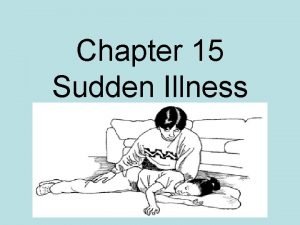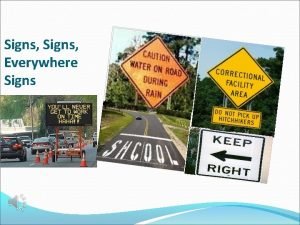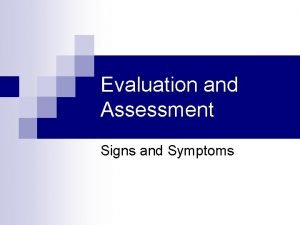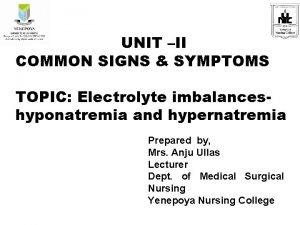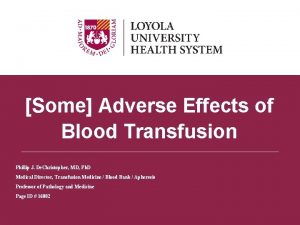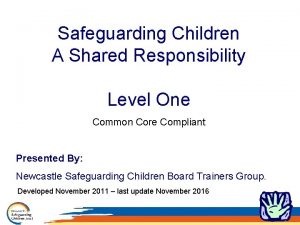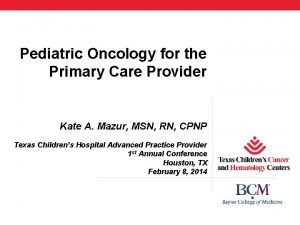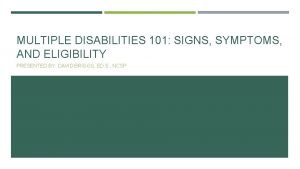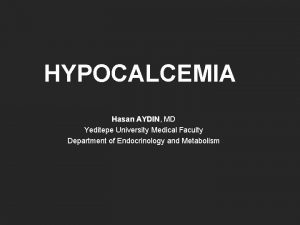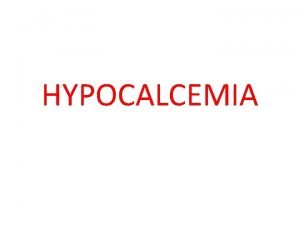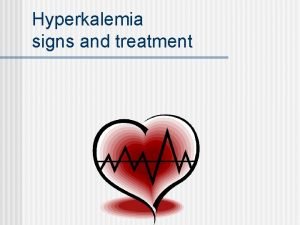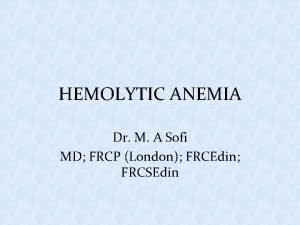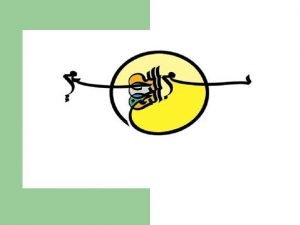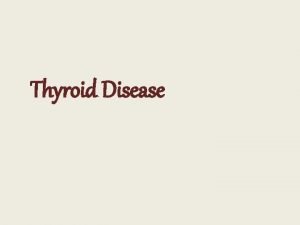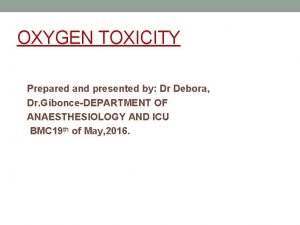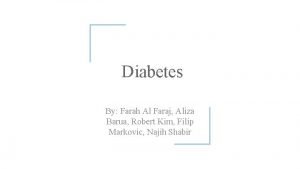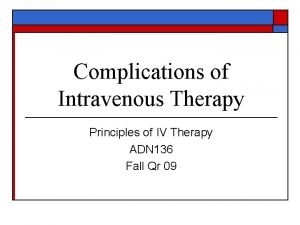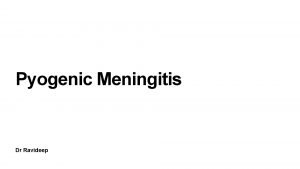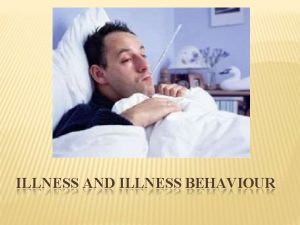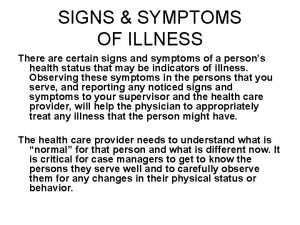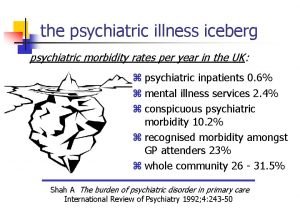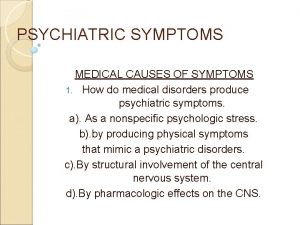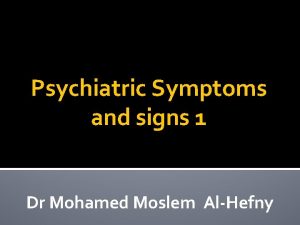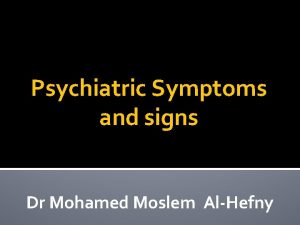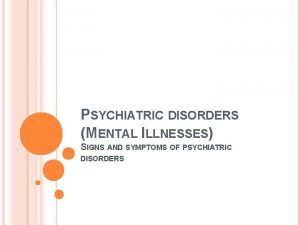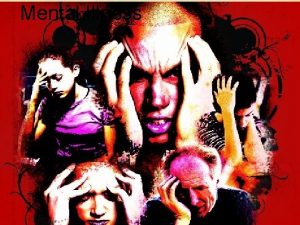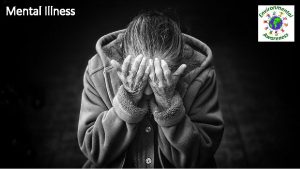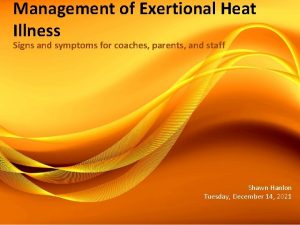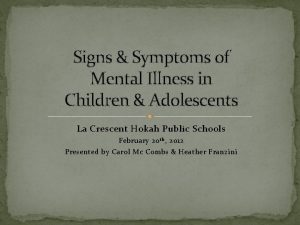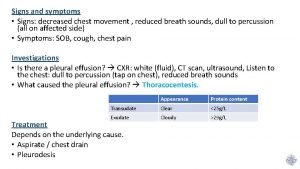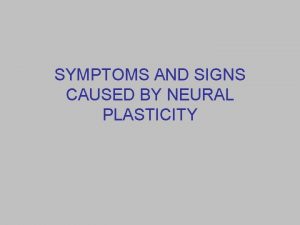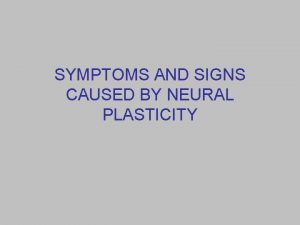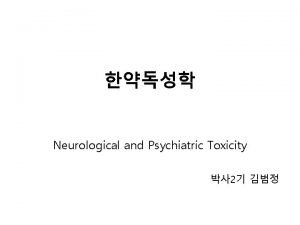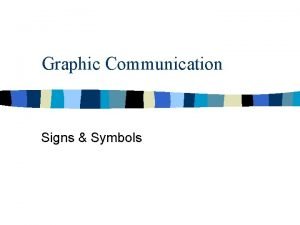Signs and symptoms of psychiatric illness Signs and
























- Slides: 24

Signs and symptoms of psychiatric illness

Signs and symptoms of psychiatric illness Signs are objective findings observed by the clinician. Symptoms are subjective experiences described by the patient. A syndrome is a group of signs and symptoms that occur together as a recognized condition that may be less than specific than a clearcut disorder or disease. Consciousness: state of awareness Apperception: perception modified by one’s own emotions and thoughts. Sensorium: state of cognitive functioning of the special senses (sometimes used as a synonym for consciousness). Disturbances of consciousness are most often associated with brain pathology.

Signs and symptoms of psychiatric illness Disturbances of attention: attention is the amount of effort exerted in focusing on certain portions of an experience; ability to sustain a focus on one activity; ability to concentrate 1. Distractibility: inability to concentrate attention; attention drawn to unimportant or irrelevant external stimuli 2. Selective inattention: blocking out only those things that generate anxiety 3. Hypervigilance: excessive attention and focus on all internal and external stimuli, usually secondary to delusional or paranoid states 4. Trance: focused attention and altered consciousness, usually seen in hypnosis, dissociative disorders, and ecstatic religious experiences

Signs and symptoms of psychiatric illness Emotion: a complex feeling state with psychic, somatic, and behavioral components that is related to affect and mood A. Affect: observed expression of emotion; may be inconsistent with patient’s description of emotion 1. Appropriate affect: condition in which the emotional tone is in harmony with the accompanying idea, thought, or speech; also further described as broad or full affect, in which a full range of emotions is appropriately expressed 2. Inappropriate affect: disharmony between the emotional feeling tone and the idea, thought, or speech accompanying it.

Signs and symptoms of psychiatric illness 3. Blunted affect: a disturbance in affect manifested by a severe reduction in the intensity of externalized feeling tone. 4. Restricted or constricted affect: reduction in intensity of feeling tone less severe than blunted affect but clearly reduced 5. Flat affect absence or near absence of any signs of affective expression; voice monotonous, face immobile. 6. Labile affect: rapid and abrupt changes in emotional feeling tone, unrelated to external stimuli.

Signs and symptoms of psychiatric illness B. Mood: a pervasive and sustained emotion, subjectively experienced and reported by the patient and observed by others; examples include depression, elation, anger 1. Dysphoric mood: an unpleasant mood 2. Euthymic mood: normal range of mood, implying absence of depressed or elevated mood 3. Expansive mood: expression of one’s feelings without restraint, frequently with an overestimation of one’s significance or importance 4. Irritable mood: easily annoyed and provoked to anger 5. Mood swings (labile mood): oscillations between euphoria and depression or anxiety

Signs and symptoms of psychiatric illness 6. Elevated mood: air of confidence and enjoyment; a mod more cheerful than usual 7. Euphoria: intense elation with feelings of grandeur 8. Ecstasy: feeling of intense rapture 9. Depression: psychopathological feeling of sadness 10. Anhedonia: loss of interest in and withdrawal from all regular and pleasurable activities, often associated with depression 11. Grief or mourning: sadness appropriate to a real loss 12. Alexithymia: inability or difficulty in describing or being aware of one’s emotions or moods.

Signs and symptoms of psychiatric illness Motor behaviour (conation): the aspect of the psyche that includes impulses, motivations, wishes, drives, instincts, and cravings, as expressed by a person’s behaviour or motor activity 1. Echopraxia: pathological imitation of movements of one person by another 2. Catatonia: motor anomalies in nonorganic disorders (as opposed to disturbances of consciousness and motor activity secondary to organic pathology) a) Catalepsy: general term for an immobile position that is constantly maintained b) Catatonic excitement: agitated, purposeless motor activity, uninfluenced by external stimuli

Signs and symptoms of psychiatric illness c) Catatonic stupor: markedly slowed motor activity, often to a point of immobility and seeming unawareness of surroundings d) Catatonic rigidity: voluntary assumption of a rigid posture, held against all efforts to be moved e) Catatonic posturing: voluntary assumption of an inappropriate or bizarre posture, generally maintained for long periods of time f) Cerea flexibilitas (waxy flexibility): the person can be molded into a position that is then maintained; when the examiner moves the person’s limb, the limb feels as if it were made of wax

Signs and symptoms of psychiatric illness 3. Negativism: motiveless resistance to all attempts to be moved or to all instructions 4. Cataplexy: temporary loss of muscle tone and weakness precipitated by a variety of emotional states 5. Stereotypy: repetitive non goal directed fixed pattern of physical action or speech 6. Mannerism: ingrained, goal directed, habitual involuntary movement 7. Automatism: automatic performance of an act or acts generally representative of unconscious symbolic activity 8. Command automatism: automatic following of suggestions (also called automatic obedience) 9. Mutism: voicelessness without structural abnormalities

Signs and symptoms of psychiatric illness 10. Overactivity a. Psychomotor agitation: excessive motor and cognitive overactivity, usually nonproductive and in response to inner tension b. Hyperactivity (hyperkinesis): restless, aggressive, destructive activity, often associated with some underlying brain pathology c. Compulsion: uncontrollable impulse to perform an act repetitively

Signs and symptoms of psychiatric illness Thinking: goal-directed flow of ideas, symbols, and associations initiated by a problem or a task and leading toward a reality-oriented conclusion; when a logical sequence occurs, thinking is normal; parapraxis (unconsciously motivated lapse from logic is also called Freudian slip) considered part of normal thinking A. General disturbances in form or process of thinking Psychosis: inability to distinguish reality from fantasy Illogical thinking: thinking containing erroneous conclusions or internal contradictions

Signs and symptoms of psychiatric illness Magical thinking: a form of dereistic thought; thinking that is similar to that of the preoperational phase in children (Jean Piaget), in which thoughts, words , or actions assume power (for example, they can cause or prevents) B. Specific disturbances in form of thought Neologism: new word created by the patient, often by combining syllables of other words, for idiosyncratic psychological reasons Word salad: incoherent mixture of words and phrases

Signs and symptoms of psychiatric illness Tangentiality: inability to have goal-directed associations of thought; patient never gets from desired point to desired goal Incoherence: thought that, generally, is not understandable; running together of thoughts or words with no logical or grammatical connection, resulting in disorganization Perseveration: persisting response to a prior stimulus after a new stimulus has been presented, often associated with cognitive disorders Echolalia: psychopathological repeating of words or phrases of one person by another; tends to be repetitive and persistent, may be spoken with mocking or staccato intonation

Signs and symptoms of psychiatric illness Loosening of associations: flow of thought in which ideas shift from one subject to another in a completely unrelated way; when severe, speech may be incoherent Flight of ideas: rapid, continuous verbalizations or plays on words produce constant shifting from one idea to another; the ideas tend to be connected, and in the less severe form a listener may be able to follow them

Signs and symptoms of psychiatric illness Specific disturbances in content of though Delusion: false belief, based on incorrect inference about external reality, not consistent with patient’s intelligence and cultural background, that cannot be corrected by reasoning Bizarre delusion: an absurd, totally implausible, strange false belief Systematized delusion: false beliefs united by a single event or theme Nihilistic delusion: false feeling that self, others, or the world is nonexistent or ending Paranoid delusions: includes persecutory delusion and delusions of reference, control, and grandeur

Signs and symptoms of psychiatric illness Delusion of control: false feeling that one’s will, thoughts, or feeling are being controlled by external forces Thought withdrawal: delusion that one’s thoughts are being removed from one’s mind by other people or forces Thought insertion: delusion that thoughts are being implanted in one’s mind by other people or forces Though broadcasting: delusion that one’s thoughts can be heard by others, as though they were being broadcast into the air Phobia: persistent, irrational, exaggerated, and invariably pathological dread of some specific type of stimulus or situation; results in a compelling desire to avoid the feared stimulus

Signs and symptoms of psychiatric illness Specific phobia: circumscribed dread of a discrete object or situation Social phobia: dread of public humiliation, as in fear of public speaking, performing, or eating in public Acrophobia: dread of high places Agoraphobia: dread of open places Erythrophobia: dread of red Claustrophobia: dread of closed places

Signs and symptoms of psychiatric illness Speech: ideas, thoughts, feelings as expressed through language; communication through the use of words and language Disturbances in speech Pressure of speech: rapid speech that is increased in amount and difficult to interrupt Poverty of speech: restriction in the amount of speech used; replies may be monosyllabic

Signs and symptoms of psychiatric illness Nonspontaneous speech: verbal responses given only when asked or spoken to directly; no self-initiation of speech Poverty of content of speech: speech that is adequate in amount but conveys little information because of vagueness, emptiness, or stereotyped phrases

Signs and symptoms of psychiatric illness Disturbances of perception Hallucination: false sensory perception not associated with real external stimuli; there may or may not be a delusional interpretation of the hallucinatory experience Hypnagogic hallucination: false sensory perception occurring while falling asleep ; generally considered nonpathological phenomenon Auditory hallucination: false perception of sound, usually voices but also other noises, such as music; most common hallucination in psychiatric disorders

Signs and symptoms of psychiatric illness Visual hallucination: false perception involving sight consisting of both formed images (for example, people) and unformed images (for example, flashes of light); most common in medically determined disorders Olfactory hallucination: false perception of smell; most common in medical disorders Gustatory hallucination: false perception of taste, such as unpleasant taste caused by an uncinate seizure; most common in medical disorders

Signs and symptoms of psychiatric illness Tactile (haptic) hallucination: false perception of touch or surface sensation, as from an amputated limb (phantom limb), crawling sensation on or under the skin (formication) Somatic hallucination: false sensation of things occurring in or to the body, most often visceral in origin Lilliputian hallucination: false perception in which objects are seen as reduced in size Illusion: misperception or misinterpretation of real external sensory stimuli Insight: ability of the patient to understand the true cause and meaning of a situations (such as a set of symptoms) Judgment: ability to assess a situations correctly and to act appropriately within that situation

Signs and symptoms of psychiatric illness Thank you
 Sudden illness examples
Sudden illness examples Sign shapes meaning
Sign shapes meaning Tender nipples sign of early pregnancy
Tender nipples sign of early pregnancy Hyperkalemia signs
Hyperkalemia signs Icaada
Icaada Taco vs trali
Taco vs trali Signs of shock
Signs of shock Daniel pelka sister
Daniel pelka sister Neuroblastoma symptoms
Neuroblastoma symptoms Signs and symptoms of multiple disabilities
Signs and symptoms of multiple disabilities Hypocalcemia symptoms
Hypocalcemia symptoms Hypocalcemia signs and symptoms
Hypocalcemia signs and symptoms What are signs of hyperkalemia
What are signs of hyperkalemia Hydroelectrolytic
Hydroelectrolytic Hemolytic anemia signs and symptoms
Hemolytic anemia signs and symptoms Diabetic ketoacidosis anion gap
Diabetic ketoacidosis anion gap Inokuchi shunt
Inokuchi shunt Hyperkalemia
Hyperkalemia Signs and symptoms of trali
Signs and symptoms of trali Carbimazole dose
Carbimazole dose Hypokalemia signs and symptoms
Hypokalemia signs and symptoms Oxygen poisoning
Oxygen poisoning Signs and symptoms of hyperglycemia
Signs and symptoms of hyperglycemia Phlebitis vs infiltration treatment
Phlebitis vs infiltration treatment Spinal meningitis in babies
Spinal meningitis in babies
